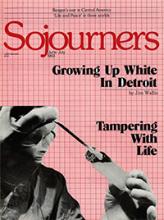In the summer of 1967, Detroit exploded into a city at war with itself. I remember vividly the terrible fear that the riots created in white people. Afraid that blacks would break out of the ghetto to attack and burn the suburbs, the police and armed, white vigilante groups stood guard at the borders of suburban communities. The vigilante groups were a visible manifestation of an attitude that ran deep.
Detroit in the 1960s was two communities, one white and one black, separate and dramatically unequal. Growing up white in Detroit, I had no exposure to black people, but for an occasional glimpse on a downtown bus or at a Tigers baseball game. What I was told about them was based on the stereotypes so common in white culture.
As a teenager, I felt the tension and hostility that pervaded the conversations among whites whenever the subject of blacks, race, the city, or crime came up; people that I knew to be otherwise kind and loving would be transformed, uttering vicious words of intolerance and fearful hatred.
I wanted to know why. Why did whites and blacks live completely divided from one another? Why were whites rich and blacks poor? What created the fear? I was persistent in taking my questions to my parents, teachers, and friends, but I soon discovered that no one could answer them.
Hoping that the church might provide some answers, I asked: "What about our Christian faith? Doesn't God love all people?" I reminded the people of the church of a song I was taught in Sunday School as a child: "Jesus loves the little children, all the children of the world; red and yellow, black and white, all are precious in his sight; Jesus loves the little children of the world."
Of course the song is true and God loves everybody, I was told, but there are differences. And of course we love everybody too, but that doesn't mean we have to live together.
Read the Full Article

